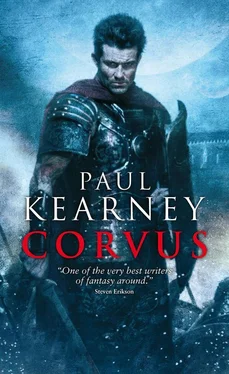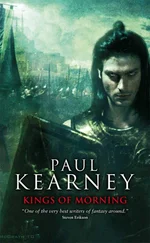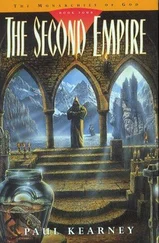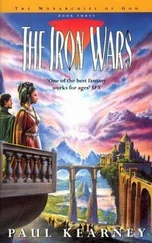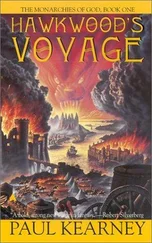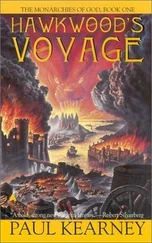Paul Kearney - Corvus
Здесь есть возможность читать онлайн «Paul Kearney - Corvus» весь текст электронной книги совершенно бесплатно (целиком полную версию без сокращений). В некоторых случаях можно слушать аудио, скачать через торрент в формате fb2 и присутствует краткое содержание. Жанр: Фэнтези, на английском языке. Описание произведения, (предисловие) а так же отзывы посетителей доступны на портале библиотеки ЛибКат.
- Название:Corvus
- Автор:
- Жанр:
- Год:неизвестен
- ISBN:нет данных
- Рейтинг книги:5 / 5. Голосов: 1
-
Избранное:Добавить в избранное
- Отзывы:
-
Ваша оценка:
- 100
- 1
- 2
- 3
- 4
- 5
Corvus: краткое содержание, описание и аннотация
Предлагаем к чтению аннотацию, описание, краткое содержание или предисловие (зависит от того, что написал сам автор книги «Corvus»). Если вы не нашли необходимую информацию о книге — напишите в комментариях, мы постараемся отыскать её.
Corvus — читать онлайн бесплатно полную книгу (весь текст) целиком
Ниже представлен текст книги, разбитый по страницам. Система сохранения места последней прочитанной страницы, позволяет с удобством читать онлайн бесплатно книгу «Corvus», без необходимости каждый раз заново искать на чём Вы остановились. Поставьте закладку, и сможете в любой момент перейти на страницу, на которой закончили чтение.
Интервал:
Закладка:
Karnos dismounted in front of the Empirion. One of the marvels of the Macht world, the dome was the height of fifty men, all in blazing white marble now tinted pink by the light of dawn, hewn block by block out of the vast stone quarries around Gan Cras and brought south on ox-drawn wagons with iron wheels. It was old as the city itself, though it did not look it. The white marble was inviolate, austere and dignified. Everything that Karnos was not.
They had lit the great flambeaux inside and the place was a shadow-textured stage humming with voices, row upon row of people lining the stone step-benches, those at the back some eighty feet above the performer’s circle below. When Karnos walked in, a roar went up, a wordless chorus of interrogation, greeting, and cat-calling.
The middle-men of the city were on their way to the Mithannon. Those who were present here comprised the two extremes of Machran society. Small tradesmen, freed slaves, and ne’er do wells. And also the highest ranking families of the city: the Alcmoi, the Terentians, the Goscrins and half a dozen more. The menfolk of these families were not subject to the levy. They would don their armour when it suited them, and provide the officers of the phalanx. That was their privilege. Whether or not they had the ability to lead men in battle was irrelevant.
And waiting for Karnos in the circle, three of the more dangerous members of the Kerusia. Katullos, Dion, and Eurymedon. These three might have been Polio’s brothers, all grey-bearded and stern, the folds of their himations draped over one forearm in the classic style. They dripped anger; it shone out of their faces.
Karnos smiled. He opened his arms, halted short of the other Kerusia members, and breathed in deep the energy of the crowd.
Gestrakos had lectured on this very spot, postulating the existence of other worlds. Ondimion had staged his tragedies upon these stones. And here Naevios himself had plucked his harp, singing the songs that were now buried deep in the souls of the Macht, even the Paean they sang at the moment of death itself.
Some men made music, some built in stone. Some led armies.
Karnos – he knew how to work a crowd. It was the reason he had been put upon the world. This was his moment.
“Brothers,” he said. And such were the superb acoustics of the Empirion that he reached the farthermost ranks of the crowd while barely raising his voice.
But he did raise it, along with his arms, outspread as though he would embrace them all if he could.
“Brothers! You know me – you know my name. I am Karnos of Machran, Speaker of the Kerusia. You put me here today by voting openly in the assembly of all free men at the Amphion of Machran, the first time in a generation that a Speaker has been so chosen. My brothers, you have honoured me beyond my deserts…”
He watched the crowd closely, alert to their postures, his ears pricked for the start of muttered conversations.
It was like reeling in a fish too heavy for the line. The mood had to be taken, massaged, guided and caressed to where he wanted it to go. A man could not storm the crowd – Katullos, the last Speaker, had tried it, and failed miserably.
“I have no family of note,” Karnos went on. “My father hammered out metal at a stall in the Mithannon – I was born there, and I know those alleys like they were the veins in my arm. He put me to work cross-legged in the street, tapping out dints in people’s pots for an obol a day before I was ten years old -”
A growl of appreciation from the crowd. They loved this stuff, the lower orders. Who needed rhetoric, when one could work on their sentimentality, the fellow-feeling of the urban poor?
“But he saw what was in me, and hired a slave for an hour every night to teach me to read and write, for he had no wish to see me back-bent and bowed and coughing up soot for the rest of my life.”
The slave had been Polio, a dark-haired, lanky young man who had found that teaching the bright, eager son of the street-smith was one way to dull the pain of his own servitude.
“When my father died, I sold his stall and his tools, and bought a single illiterate highland boy. I educated him in his turn, sold him at a profit, and never looked back.”
That had been about the same time that the Ten Thousand had returned from their failed expedition to the Empire. Karnos remembered it well. A few centons of them had marched through Machran, invited by Dominian, Speaker at the time. The famous Rictus had not been there, but all the same, the streets were clogged five deep to see the heroes of the east in their scarlet cloaks.
Karnos still remembered the lean and hungry look on their faces, their eyes still fixed on some invisible horizon.
It was the first time he had seen the mob of Machran in full voice on the streets, and he had never forgotten it. What would it be like, to have that adulation thrown at him – or to have those thousands hang on his words? It had been the beginning of the slow fire of ambition that had burned in his gut ever since.
“But I will not bore you with my life story – you’ve heard it all before. Brothers, it is enough for me to say that I came from where you are.”
His gaze swept the curved ranks of the amphitheatre. He let the statement hold the air a moment, saw a stir of restlessness, and plunged on.
“I am an ambitious man, that is true – were I not I would still be hammering pots in the Mithannon. But I am a man of Machran – this is my city. My life has been and always will be within her walls. I would never – never – do anything that would harm this place. I would rather die first.” Now the richly clad men near the bottom of the circle stirred. He saw some smirk.
“And brothers, know this: I have never lied to you. You know I am no hypocrite. I like wine, women, and as much amusement as I can pack into my life -this I have never tried to hide -” Now the common folk were smirking, and a few laughed out loud. “Aye, we know that all right!” someone cackled, and there was a buzz of laughter.
He had to grip them again, quickly. “So I am here today with no pretences, no defences. I come to you with the truth in my hands, to give to you. It is your privilege to do with it what you will.”
The baleful stares of the other Kerusia members present could almost be felt on his back. An irrational part of him twitched at the thought of a knife plunging into him, unseen, unexpected. The Empirion had seen it happen before.
He took a few steps forward, closer to the rising slope of the crowd, until he could smell the perfumes and scented soaps of those near the floor, and the unwashed miasma of those higher up in the dome.
“I hereby formally convene this gathering as an emergency assembly, gathered in time of war, to vote upon extraordinary measures taken this day by myself and the polemarch of the host, Kassander of Arienus.” Phobos – now he had their attention all right. In the next few minutes he would either have saved his career or would be feeling that knife in his back for real.
“You have all heard of the capitulation of Hal Goshen, after an eight-day defence by its people and the leader of the Kerusia, Phaestus. The enemy of us all, Corvus the warmonger, is on the march as I speak, barely a fortnight from our own walls.
“Brothers, on my own authority, I called out the levies this morning; they are gathering now at the Mithos River. I did this with the full support of our polemarch, but without the consultation of my fellow Kerusia members. Hence, I acted illegally.”
There it was. He had admitted it publicly.
“I hereby ask now for a vote on my actions. I did what I did for the good of the city and of us all, with no thought of my own position or ambitions – this I swear to you by Antimone’s Veil. I ask now that you vote to retrospectively legalise the call-out, so that we can go on to organise an effective defence of this city against he who would destroy your freedoms forever.
Читать дальшеИнтервал:
Закладка:
Похожие книги на «Corvus»
Представляем Вашему вниманию похожие книги на «Corvus» списком для выбора. Мы отобрали схожую по названию и смыслу литературу в надежде предоставить читателям больше вариантов отыскать новые, интересные, ещё непрочитанные произведения.
Обсуждение, отзывы о книге «Corvus» и просто собственные мнения читателей. Оставьте ваши комментарии, напишите, что Вы думаете о произведении, его смысле или главных героях. Укажите что конкретно понравилось, а что нет, и почему Вы так считаете.
